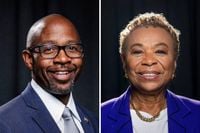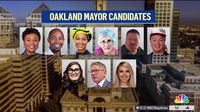In an exciting turn of events during the special election held on April 15, 2025, Loren Taylor emerged as the frontrunner to become Oakland's next mayor, capturing nearly 49 percent of the vote in the first round of ranked-choice voting, according to the Alameda County Registrar of Voters' Office. Former U.S. Representative Barbara Lee closely followed with approximately 45 percent of the votes cast, while the remaining candidates garnered less than 2 percent each.
The preliminary results, announced around 9:30 p.m., indicate a competitive race between Taylor and Lee, both of whom are seasoned political figures with deep ties to the Oakland community. The election was called following the recall of former Mayor Sheng Thao in November 2024, who faced significant backlash over allegations of corruption and fraud.
As the city awaits the final vote tally, which could take several days to complete due to the ranked-choice voting process, the anticipation builds. The next scheduled update from the registrar's office is set for April 18, 2025. This election not only determines the next mayor but also reflects the city's political climate following the tumultuous recall of Thao, with voters keenly aware of the implications for Oakland's future.
Lee, who served as Oakland's congressional representative from 1998 until 2025, has been a prominent figure in local and national politics. She previously held positions in the California State Assembly and Senate, making her a familiar name in the community. Taylor, a former city council member and founder of the political advocacy group Empower Oakland, narrowly lost the mayoral race to Thao in 2022 by less than 700 votes after nine rounds of ranked-choice voting.
Voter sentiment on the ground was mixed, as evidenced by conversations with residents outside polling places. Some expressed uncertainty about their choices, reflecting a broader indecision among voters. "It’s Barbara Lee versus Loren Taylor, basically, and I’m kind of conflicted on both of them," said Laurence Miotto, who ultimately decided to rank Lee first. This sentiment was echoed by others who were torn between the two candidates.
The stakes are high for both candidates. Taylor's campaign focuses on addressing Oakland's pressing issues, including a significant budget deficit and rising crime rates. He proposes to secure concessions from large companies and improve police response times, emphasizing a need for change. "We have an urgency at the moment now that we have seen how bad things can get," Taylor stated, highlighting voters' desire for a new direction.
Meanwhile, Lee aims to leverage her extensive experience to stabilize the city’s finances and enhance public safety. She plans to increase the police force and support community organizations that provide mental health services, stating, "My experience in leadership and my fighting for people here in Oakland is an example of how I want to work as mayor to deliver core services." Both candidates have committed to securing outside investments to alleviate the city's financial woes, illustrating their shared understanding of Oakland's economic challenges.
As the election unfolds, voters will also decide on Measure A, a proposed half-cent sales tax increase aimed at raising between $20 million and $30 million annually for the next decade. Early returns show approximately 64 percent of voters approving the measure, reflecting a strong desire to address the city's ongoing budget shortfall, which is estimated at $280 million over the next two years.
In addition to the mayoral race, voters will select a new council member for District 2, following the departure of Nikki Fortunato Bas to the Alameda County Board of Supervisors. Charlene Wang is currently leading in early returns for the District 2 seat, with about 52 percent of the vote, while Kara Murray-Badal and Harold Lowe III trail behind.
This special election is not just a choice between candidates; it represents a pivotal moment for Oakland as residents grapple with the implications of recent political upheaval. The outcome will shape the city's trajectory in addressing critical issues such as crime, economic stability, and community engagement.
As the final votes are counted, Oaklanders remain hopeful that their voices will resonate through the electoral process. The city’s future hinges on the decisions made in this election, and both Loren Taylor and Barbara Lee are acutely aware of the responsibilities that await the next mayor.
In the coming days, as the results solidify, the community will watch closely to see whether Taylor's vision for a more progressive Oakland resonates with voters or if Lee's extensive political background and commitment to public service will secure her the mayoral seat. Regardless of the outcome, this election signifies a critical juncture for Oakland, with the potential to reshape the city's leadership and direction for years to come.







